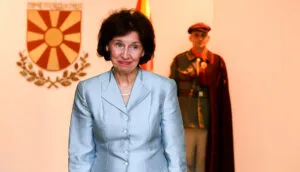Brussels – It took less than 50 days for nationalists in North Macedonia to occupy top political positions after the May 8 double triumph at the polls and reignite all the major political tensions in Skopje in the Balkan region. The Macedonian Democratic Party for National Unity (VMRO-DPMNE) is back in government after eight years in opposition thanks to the go-ahead that came yesterday (June 23) from the North Macedonian Assembly, with 77 votes in favour and 22 against (out of 120), and now its leader, Hristijan Mickoski, is officially heading the new executive in Skopje. But just as was the case when the new President of the republic, Gordana Siljanovska-Davkova, took office, the beginning does not bode well for an easy political transition, especially in terms of relations with regional neighbours on the continuation of the road to European Union membership.

“We will continue to stand together with our EU partners and harmonize common foreign policy,” assured the new head of North Macedonia’s government in his inauguration speech before the national Parliament about international relations with Russia and Ukraine. However, he was crystal clear in the passage about the steps to achieve EU membership, which, according to the agreements made in Brussels, should pass through a constitutional compromise for the recognition of the country’s Bulgarian minority (with language concessions): “It will not pass, and there will be no constitutional changes as long as I am here.” This is hardly a surprise, since already in the election campaign, Mickoski promised to keep a hard line on language and historical issues, i.e. those purely identity-based. However, after unsuccessful attempts over the past year and a half by the Social Democrat-led government to amend the Constitution to recognize the Bulgarian minority (without ever finding the two-thirds of MPs needed to pass the motion), this could be the turning point for a new—dreaded—halt in EU accession negotiations for North Macedonia.
Bulgaria is precisely one of the biggest obstacles for Skopje among the Twenty-Seven. The General Affairs Council in Sofia announced on December 9, 2020, that the EU accession negotiations with North Macedonia would not start. The negotiations remained deadlocked for over 18 months until a breakthrough occurred in the summer of 2022. Thanks to the initiative of French President Emmanuel Macron, first, the Bulgarian Parliament lifted its veto and then also the Macedonian Parliament approved the understanding: with the signing of the bilateral protocol between Sofia and Skopje, the situation was finally unblocked, and the first intergovernmental conferences for North Macedonia (and Albania, linked by the same dossier) could be reached on July 19, 2022, after almost three years. But to open the first Cluster of EU accession negotiations requires not only a whole series of reforms—from the judiciary to public procurement management, from the fight against corruption to public administration reform—but also those amendments to the Constitution on minorities in the country that newly appointed Prime Minister Mickoski refuses to implement.

Then, in the past month, the relationship with another historical opponent of North Macedonia at the regional level, Greece, has also creaked again. Just how the newly appointed President of the Republic Siljanovska-Davkova (candidate of VMRO-DPMNE) had done on the day of her inauguration on May 12, also the newly appointed Prime Minister Mickoski repeatedly referred to his country as “Macedonia” and not “North Macedonia”. The absence of the word “North” has a definite nationalistic meaning, beginning with independence from Yugoslavia in 1991 and especially with the EU membership bid since 2005. Skopje’s path was obstructed until 2018 by Greece over the identity dispute over the use of the name of Alexander the Great’s homeland because both countries claim it as an exclusive part of their history and cultural heritage. Only with the Prespa Agreements signed on June 12, 2018, by the then prime ministers of Greece, Alexis Tsīpras, and Macedonia, Zoran Zaev, the Republic of Macedonia became North Macedonia Republic. They renounced the use of the Sun of Verghina—a symbol of the Macedonian royal dynasty—receiving in return from Athens the recognition of the Macedonian language and the green light for Skopje’s membership in NATO and the European Union.

The Greek Minister of Foreign Affairs, Georgios Gerapetritis, had already openly condemned the mid-May attitude of the newly installed Macedonian President, calling it “a flagrant violation of the Prespa Agreement and the Constitution of our neighbouring country,” and had ominously warned that “progress on the European path depends on the full implementation of the Prespa Agreement and mainly on the use of the country’s constitutional name.” The new provocation from the newly installed executive in Skopje certainly does not go in the direction of detente. But even in Brussels, Athens’ (and indirectly Sofia’s) line is fully shared: “For North Macedonia to continue on its successful path toward EU membership, it is essential that the country continue on the path of reforms and full compliance with binding agreements, including the Prespa Agreement,” had been the words of the Presidents of the European Commission, Ursula von der Leyen, and the European Council, Charles Michel, to the new nationalist establishment in Skopje.
Find more insights on the Balkan region in the newsletter BarBalcani hosted by Eunews
English version by the Translation Service of Withub





